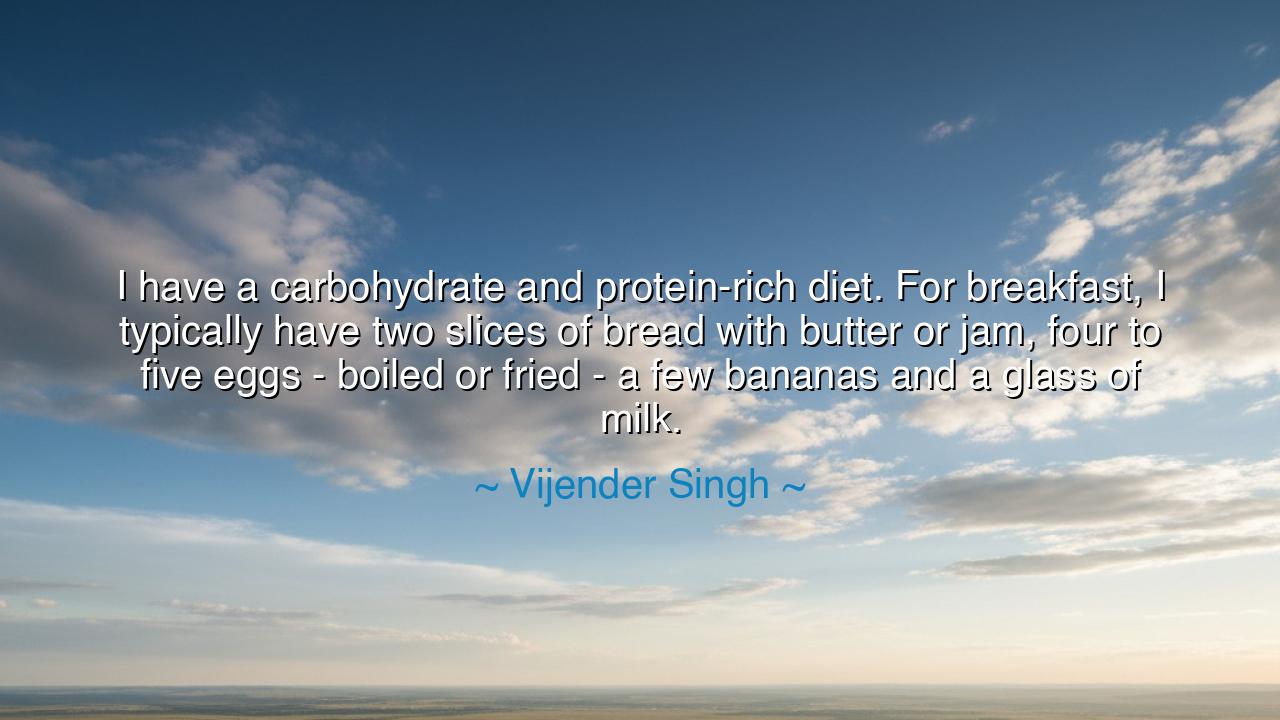
I have a carbohydrate and protein-rich diet. For breakfast, I
I have a carbohydrate and protein-rich diet. For breakfast, I typically have two slices of bread with butter or jam, four to five eggs - boiled or fried - a few bananas and a glass of milk.






In the straightforward words of Vijender Singh, there lies a wisdom deeper than appetite: “I have a carbohydrate and protein-rich diet. For breakfast, I typically have two slices of bread with butter or jam, four to five eggs—boiled or fried—a few bananas, and a glass of milk.” To the casual ear, this may sound like a simple description of a meal. Yet to those who listen with the heart of an ancient philosopher, these words reveal a sacred truth—that strength is born of nourishment, and that the body, when honored rightly, becomes the chariot of the spirit. Singh, a champion forged in the fire of discipline, reminds us that greatness begins not in the roar of battle, but in the quiet ritual of daily care.
For what is a diet, if not a covenant between body and will? In every morsel chosen with purpose lies an act of devotion—an offering to the self that strives to rise above fatigue, fear, and weakness. The carbohydrates he speaks of are not mere fuel; they are the energy of endurance, the fire that sustains motion. The proteins, drawn from eggs and milk, are the building blocks of resilience—the silent artisans of recovery and renewal. Even the bananas and butter play their part, balancing sweetness and strength, teaching that even the mightiest warrior must temper power with joy. Thus, his meal is not indulgence, but ritual—a ceremony of preparation before the day’s trials.
The ancients, too, knew this truth well. The Spartans, before setting out for battle, would dine not in excess but in purpose—on broth rich in sustenance, their minds as disciplined as their bodies. The gladiators of Rome, known as the “barley men,” understood that diet was a weapon as vital as the sword. They ate not for pleasure, but for endurance, for mastery over their own flesh. And so it is with Singh, whose words echo these warriors of old. His breakfast is not luxury—it is the armor of the athlete, forged in simplicity, worn with reverence.
Yet beneath his words, there is also humility. He does not boast of exotic foods or secret formulas; he speaks of bread, eggs, and milk—the fare of the common man. In this, he teaches that greatness does not demand extravagance, only discipline and consistency. The body, like the spirit, thrives on order. The strongest trees grow not from rare seeds, but from daily sunlight and water. Likewise, the champion’s body is not built overnight, but through years of balance—of feeding, training, resting, and rising again.
Consider the story of Milo of Croton, the ancient Greek wrestler whose legend endures as a parable of strength and perseverance. It is said that as a boy, Milo carried a newborn calf upon his shoulders. Each day, he lifted it again as it grew, until at last he bore a full-grown bull. His diet, rich in bread, wine, and meat, was no less disciplined than his labor. From this simple routine, he built an empire of muscle and will. Vijender Singh, in his own time, walks this same eternal path—his eggs and milk the modern echo of Milo’s feast. For in every age, the principle is the same: to conquer the world, one must first master the body.
But Singh’s wisdom goes beyond strength—it touches upon gratitude. In speaking of his food, he honors the hands that prepare it, the earth that yields it, the discipline that allows him to earn it. The athlete’s meal becomes a prayer of thanks: to nourishment, to perseverance, to life itself. For those who toil, whether in the arena or in the quiet struggles of daily living, food is not merely sustenance—it is communion with the effort that defines us. To eat mindfully is to remember that the power to act, to create, to overcome, begins with honoring the vessel that bears the soul.
Thus, the teaching of his words is clear and timeless: Feed your strength, not your indulgence. Treat every meal as an act of intention, not escape. Let your food serve your purpose, not your cravings. To rise each morning and eat with awareness is to declare, “I am preparing for life, not hiding from it.” Whether one is a boxer, a builder, or a dreamer, the lesson is the same: discipline in the small things shapes destiny in the great.
So, remember this, O seeker of excellence: The path to mastery begins not in the grand gestures, but in the humble choices. The bread that strengthens the hands, the milk that nourishes the bones, the eggs that rebuild the body—all are symbols of a greater truth. To care for one’s body is to honor one’s purpose. To eat with intention is to live with power. And to live with power, tempered by humility, is to walk the timeless road of the heroes—those who feed not just their flesh, but their spirit, in pursuit of glory that endures beyond the dawn.






AAdministratorAdministrator
Welcome, honored guests. Please leave a comment, we will respond soon